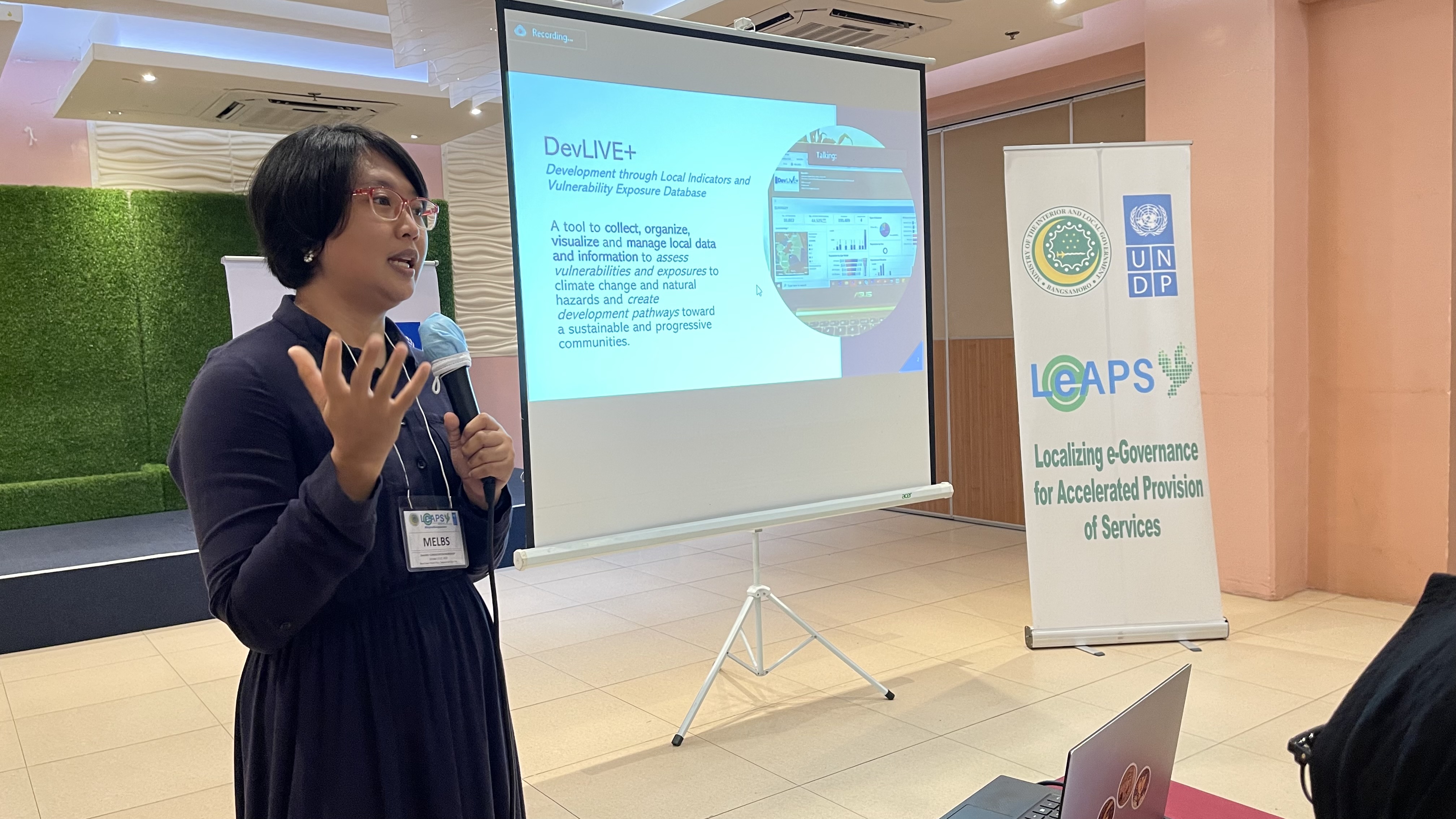LeAPS Program holds consultation workshop to enhance DevLIVE+ rollout for BARMM digitalization
October 19, 2022

Ms. Melba Tutor, monitoring and evaluation expert and UNDP consultant, speaks about DevLIVE+ in the consultation workshop
Cagayan de Oro City, 18 October 2022 – The UNDP Localizing e-Governance for Accelerated Provision of Services (LeAPS) Program held a consultation workshop from 17-21 October 2022 at Cagayan de Oro City to enhance the rollout of the Development through Local Indicators and Vulnerability Exposure Database (DevLIVE+) instruments and indicators in the Bangsamoro Autonomous Region in Muslim Mindanao (BARMM).
The workshop captured inputs and feedback from the participants on enhancing the Community-based Monitoring System (CBMS) by contextualizing the tool with the religion, culture, and diversity in BARMM and by including DevLIVE+ indicators.
Participants of the workshop are from the Office of the Chief Minister, the local government units of Talipao of Sulu Province and Taraka of Lanao del Sur Province, the Bangsamoro Planning and Development Authority, the Ministry of the Interior and Local Government, and The Moropreneur Inc.
Data for the Community
According to the Department of the Interior and Local Government, the CBMS is a diagnostic tool used to assess poverty on the barangay, municipal, city, and provincial level. It provides policymakers and program implementers with a good information base for tracking the impacts of macroeconomic reforms and various policy shocks. In 2019, Republic Act 11315, referred to as the CBMS Act, was put into law and seeks to establish and adapt CBMS in all cities and municipalities and appropriate funds for it.
The LeAPS Program, a partnership between UNDP and MILG-BARMM, intends to harness the transformative power of data, digitalization, and people-centered governance. Among its key objectives is to deliver better public services more quickly and cost effectively by unlocking the value in data and recognizing it as a strategic asset for the pursuit of public good.
Its vital component called DevLIVE+ is a system and tool used to collect, organize, visualize, and manage baseline data and information about households and other physical structures. These are then used to monitor access to basic services, assess vulnerabilities and hazard exposures, provide guidance on development planning, and create development pathways towards sustainable and progressive communities.

Ministry of the Interior and Local Government Director General Khalid Dumagay welcomed the participants of the workshop, stressing the need for data to monitor access to basic services, assess vulnerabilities and hazard exposures, provide guidance on development planning, and create development pathways towards sustainable and progressive communities.
Finding solutions in data
For BARMM, DevLIVE+ goes beyond household profiling. It facilitates the strengthening of Bangsamoro institutions through evidence-based regional planning and programming among BARMM Ministries. This ensures that government’s services are accessible to the most vulnerable individuals.
Ms. Sharifa Asanol, Research and Planning Officer of Talipao, expressed her excitement about the rollout DevLIVE+ in their municipality. “The process of planning could become frustrating if you do not have data. You will not be able to customize your services that would fit to your constituents’ needs, nor will you be able to really see how the community is,” Asanol said.
She added, “The whole country needs CBMS, actually and not just BARMM. Issues and matters that an LGU will need to respond to and look into, they will find in data, including where their services fall short. There is a dire need for accurate and real-time data in BARMM.”
The LeAPS Program is set to pave the way for the initial five-year Digital Transformation Roadmap of BARMM in consideration of a mid-term (10+ years) and long-term (20+ years) roadmap after 2023. DevLIVE+ will be implemented in eight selected BARMM local government units for 2022, and ultimately aims to cover all the 124 municipalities and all the barangays in the region. ###

 Locations
Locations






